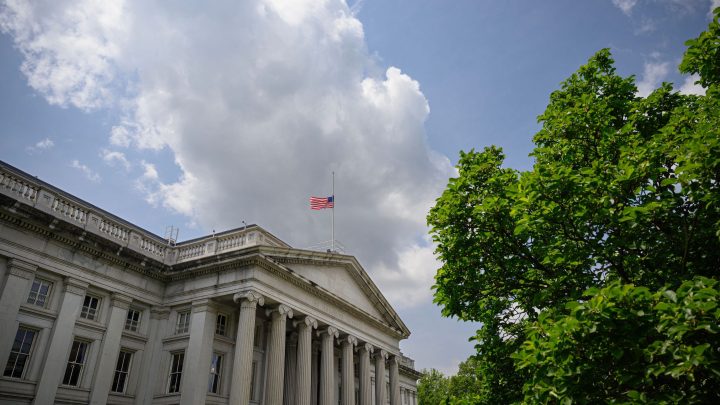
With demand down, there’s a new buyer of Treasurys in town
With demand down, there’s a new buyer of Treasurys in town

The Treasury Department on Wednesday released its quarterly refunding statement — basically, that’s where the Treasury tells the world how much debt it would need to issue to keep the U.S. government’s lights on. The Treasury said will be auctioning off $112 billion in bonds next week, part of the $776 billion in borrowing the Treasury will do this quarter.
Demand for those bonds will dictate the yield those bonds pay, and the yield those bonds pay will affect rates on mortgages and car loans and a whole lot of other stuff. The thing is, the buyers for those bonds aren’t who they used to be. And that matters a lot in this economy.
All types of institutions, including banks, foreign governments and pension funds, buy U.S. Treasurys because they’re still a safe asset.
But among those buyers, over the last decade there’s been one 500-pound gorilla — or a $4.9 trillion gorilla, if you measure by the amount of Treasurys it still owns: the U.S. Federal Reserve.
The Fed started buying U.S. debt after the Great Recession, and then bought lots more after COVID-19 hit to stimulate the economy, a.k.a. quantitative easing.
But because of inflation, the Fed now wants to slow down the economy. So it basically stopped buying Treasurys last year, a.k.a. quantitative tightening.
“A mechanism that they are relying on to tighten monetary policy, and hopefully bring inflation back to that 2% target,” said Brandon Swensen, a bond specialist at BlueBay Asset Management.
The Fed isn’t the only big buyer bowing out of the Treasury market. Major U.S. banks are also buying less than they used to.
In the wake of the failure of Silicon Valley Bank, many are struggling with a smaller deposit base and just have less money to invest, said Marvin Loh, managing director at State Street.
“They need to reduce some of the asset side of their businesses, and they’re looking at doing it by slowing and reducing their overall Treasury holdings,” he said.
Some foreign governments like China have also curtailed their Treasury purchases recently.
All told, less demand means higher yields, and interest on the 10-year T-note is still flirting with 16-year highs.
But there’s a new, opportunistic buyer that has stepped into the picture: hedge funds.
“Hedge funds indeed have been taking large speculative positions in U.S. Treasurys. Now on the order of $2 trillion, they’re one of the largest groups of owners,” said Darrell Duffie, an economist at Stanford University.
Duffie said interest rates might be even higher if not for hedge funds, but their aggressive trading may lead to unwanted volatility in what should be the safest, most liquid bond market in the world.
There’s a lot happening in the world. Through it all, Marketplace is here for you.
You rely on Marketplace to break down the world’s events and tell you how it affects you in a fact-based, approachable way. We rely on your financial support to keep making that possible.
Your donation today powers the independent journalism that you rely on. For just $5/month, you can help sustain Marketplace so we can keep reporting on the things that matter to you.












